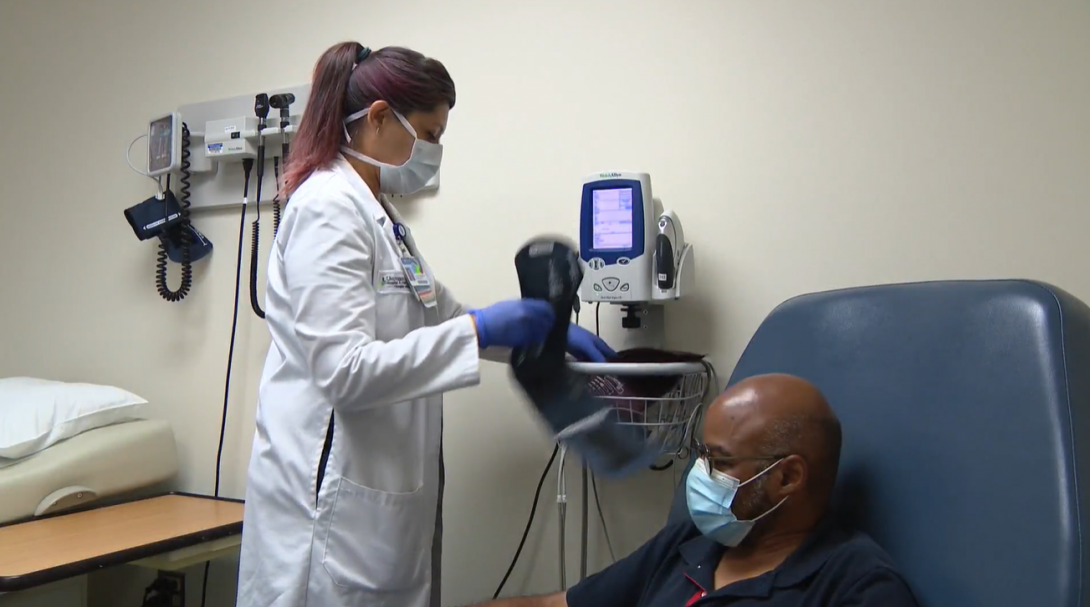A Crucial Role in the Race for a COVID Vaccine
story Heading link

When the novel coronavirus SARS-CoV-2 reached the United States in 2020, life quickly came to a standstill. Chicago was among the first sites of an outbreak of the new disease, COVID-19.
Hospitals across the city were flooded with patients from all backgrounds fighting for their lives. Black and Hispanic Chicagoans were dying at higher rates because of their higher representation in essential professions and unequal access to health care.
In the following months, the race was on for the scientific community to develop a safe, effective vaccine. It was during this urgent period that the University of Illinois at Chicago’s Dr. Richard Novak got a call from the National Institutes of Health.
Dr. Novak’s team at UIC’s Project WISH has a 25-year history of conducting research and clinical trials to prevent and treat infectious diseases, primarily devoted to the search for a vaccine against HIV. It was also a member of the Vaccine Trials Evaluation Network, with existing staff and infrastructure to support a phase III vaccine trial on human subjects.
“Everything unfolded very rapidly,” recalls Dr. Novak. “The plan was to conduct phase III clinical trials of five vaccines with 30,000 people each, an unprecedented scope. We were assigned to be part of the first Moderna trial.”
A clinical trial of unprecedented scale and a need to reflect Chicago’s diversity
Dr. Novak and his team at Project WISH were tasked with enrolling 500 people to participate in the clinical trial over two months. For comparison, an HIV-related clinical trial they were conducting at the time had to enroll 60 people over 18 months.
“I didn’t have the staff or the space. I approached the university’s Center for Clinical and Translational Sciences (CCTS) to see if their Clinical Research Center could help. They were happy to participate,” says Dr. Novak.
The Clinical Research Center provides UIC with clinical research professionals who can help with planning trials, data collection, performing tests or procedures, and providing education to research subjects. Its staff, made up of registered nurses, advanced practice nurses, and clinical research coordinators, was exactly who Dr. Novak’s team needed to conduct a clinical trial of this magnitude.
An important consideration in the clinical trial was ensuring that the participants reflected the diversity of Chicago.
“With Black and Hispanic populations being disproportionately affected by COVID and having higher mortality rates, it was important for us to know that this vaccine was effective in people of all races and ethnicities,” emphasizes Dr. Novak. “If there was any reason to believe that the vaccine was less effective in any group, we needed to know that.”
A nationwide registry organized by the Coronavirus Prevention Network, made up of existing clinical trial research networks, helped identify people willing to participate in the trial. Ultimately, Dr. Novak’s team was able to ensure that between 20 to 25 percent of the vaccine trial participants were Black and Hispanic, which reflects Chicago’s population.
In addition to evaluating the Moderna vaccine’s overall safety and effectiveness, the diversity of the trial participants made it possible for Dr. Novak’s team to conclude the vaccine was safe and effective across races and ethnicities. It also proved to be helpful for vaccine education and addressing vaccine hesitancy.
“Our first two study participants identified as African-American and Black Latino, respectively. They were in the news a lot and did public service announcements. When we were doing education in different communities, we were able to say that we know the vaccine is safe and effective in Black and Latinx people because they participated in the study,” explains Dr. Novak.
Valuable experience and infrastructure for conducting clinical trials
Looking back, Dr. Novak is especially grateful for the resources and expertise of CCTS’ Clinical Research Center.
“CCTS has so many resources for anybody who wants to do research. Research with animal or human subjects is very tightly regulated, so the Clinical Research Center can help navigate that process,” says Dr. Novak.
“It’s there to help people move their research forward and give them the tools to do it. I’ve been doing clinical research since 1986 and there were no tools like this at that time,” he adds.
Today, the United States has three available vaccines against COVID-19. That is in part due to the hard work and clinical research expertise of Dr. Novak’s team at Project WISH and CCTS’ Clinical Research Center — and the heroism of the everyday Chicagoans who participated in the clinical trial.
With vaccines preventing severe illness and death from COVID-19, communities across Chicago and beyond have begun to put the fear and uncertainty of the pandemic behind them.